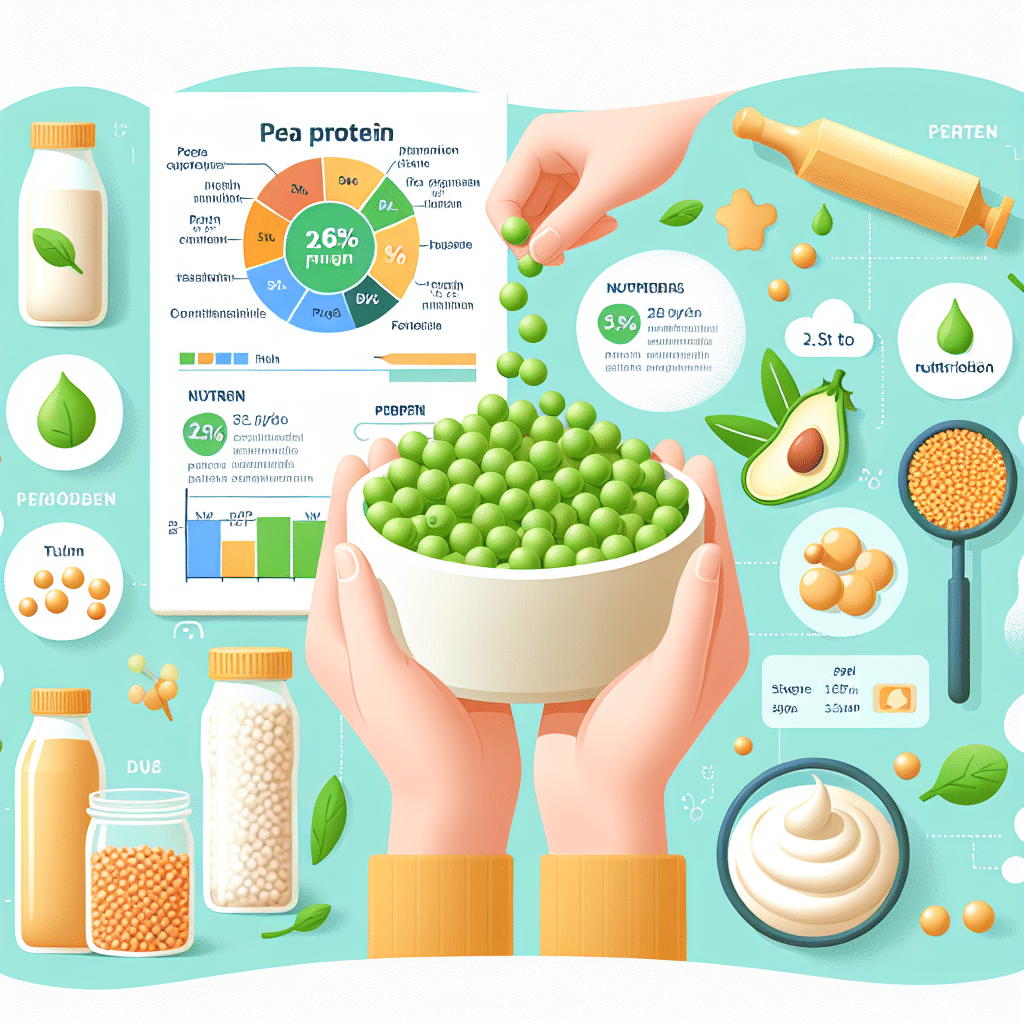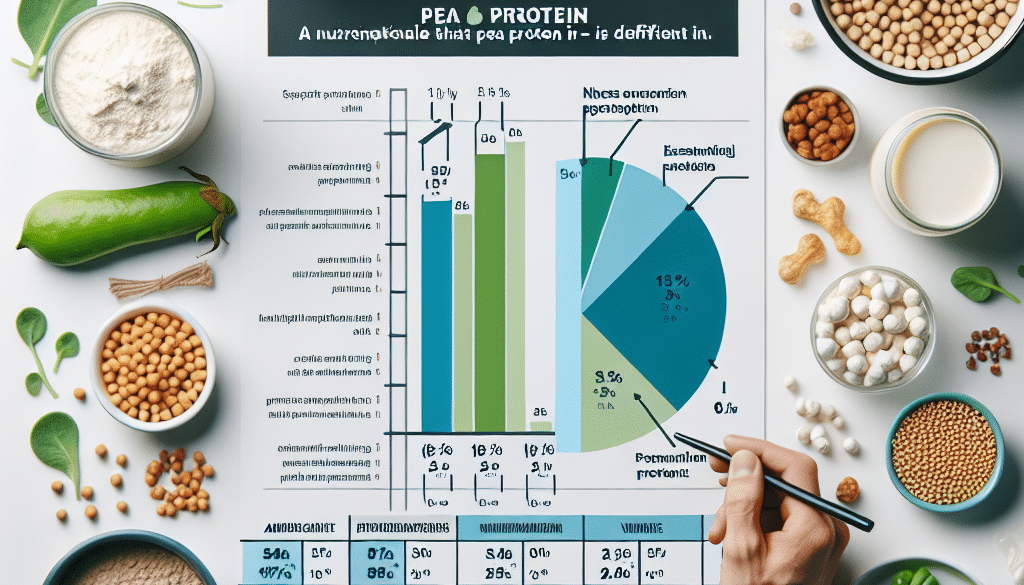What Is Pea Protein Deficient In?
-
Table of Contents
- Pea Protein: Understanding Its Nutritional Profile and Deficiencies
- Nutritional Composition of Pea Protein
- Amino Acid Profile and Limitations
- Other Nutritional Deficiencies in Pea Protein
- Addressing the Deficiencies
- Case Studies and Statistics
- Conclusion: Balancing the Benefits and Limitations of Pea Protein
- Discover ETprotein’s Premium Plant-Based Proteins
Pea Protein: Understanding Its Nutritional Profile and Deficiencies

Pea protein has emerged as a popular plant-based alternative to animal-derived proteins, especially among vegetarians, vegans, and individuals with dietary restrictions. Derived from yellow split peas, this protein source is celebrated for its high protein content, digestibility, and hypoallergenic nature. However, like all protein sources, pea protein has its limitations. In this article, we will delve into what pea protein is deficient in, exploring its nutritional profile, and how these deficiencies can be addressed.
Nutritional Composition of Pea Protein
Pea protein is known for its rich protein content, which is comparable to that of animal-based proteins. It contains a good balance of essential amino acids, except for one – methionine. Pea protein is also low in fat and carbohydrates, making it an attractive option for those looking to increase their protein intake without adding excessive calories. Additionally, it is a good source of iron and arginine, an amino acid beneficial for heart health and blood flow.
Amino Acid Profile and Limitations
The amino acid profile of a protein source is critical in determining its quality. Essential amino acids are those that the body cannot synthesize and must be obtained through diet. Pea protein contains all nine essential amino acids, but it is not considered a complete protein due to its low methionine content. Methionine plays a vital role in metabolism and detoxification and is a precursor to cysteine, which is necessary for the synthesis of glutathione, an important antioxidant.
- Lysine: Pea protein is rich in lysine, which is often lacking in grain-based proteins.
- Arginine: Abundant in pea protein, arginine supports the immune system and hormone function.
- Leucine, Isoleucine, and Valine: These branched-chain amino acids (BCAAs) are well-represented in pea protein and are crucial for muscle building and repair.
- Methionine: This is the limiting amino acid in pea protein, which can affect the overall nutritional value of the protein.
Other Nutritional Deficiencies in Pea Protein
Aside from its amino acid profile, pea protein may lack other nutrients that are commonly found in animal proteins or other plant-based alternatives:
- Vitamin B12: Often found in animal products, this vitamin is absent in pea protein, making supplementation necessary for those who rely heavily on plant-based proteins.
- Omega-3 Fatty Acids: Unlike some animal proteins, pea protein does not contain omega-3 fatty acids, which are essential for heart health.
- Heme Iron: The iron in pea protein is non-heme, which is less readily absorbed by the body compared to the heme iron found in animal proteins.
Addressing the Deficiencies
To compensate for the deficiencies in pea protein, consumers can adopt various strategies:
- Combining Proteins: Consuming pea protein with other plant-based proteins that are rich in methionine, such as rice protein, can create a complete amino acid profile.
- Supplementation: Taking supplements for nutrients like vitamin B12 and omega-3 fatty acids can help fill the gaps in a plant-based diet.
- Dietary Diversity: Including a variety of foods in the diet ensures a broader spectrum of nutrients, reducing the impact of any single deficiency.
Case Studies and Statistics
Research has shown that plant-based diets can be nutritionally adequate when properly planned. A study published in the Journal of the International Society of Sports Nutrition found that pea protein supplementation could promote muscle thickness gains during resistance training to a similar extent as whey protein. This suggests that with the right dietary adjustments, pea protein can be an effective component of an athlete’s diet.
Statistics indicate that the global pea protein market is expected to grow significantly, driven by increasing health consciousness and dietary shifts towards plant-based nutrition. According to a report by Grand View Research, the global pea protein market size was valued at USD 213.1 million in 2021 and is expected to expand at a compound annual growth rate (CAGR) of 12.7% from 2022 to 2030.
Conclusion: Balancing the Benefits and Limitations of Pea Protein
In conclusion, while pea protein is a valuable source of plant-based protein with many health benefits, it is deficient in certain amino acids, particularly methionine, and lacks some nutrients found in animal proteins. By understanding these limitations and adopting strategies to address them, individuals can enjoy the benefits of pea protein as part of a balanced and nutritionally complete diet.
Discover ETprotein’s Premium Plant-Based Proteins
If you’re looking for high-quality pea protein and other plant-based protein options, ETprotein offers a range of products that cater to various dietary needs. Their pea protein is characterized by a neutral taste, non-GMO, and allergen-free attributes, making it an excellent choice for those seeking a clean and sustainable protein source. With a commitment to quality and customer satisfaction, ETprotein is a go-to supplier for all your protein requirements.
About ETprotein:
ETprotein, a reputable protein and L-(+)-Ergothioneine (EGT) Chinese factory manufacturer and supplier, is renowned for producing, stocking, exporting, and delivering the highest quality organic bulk vegan proteins and L-(+)-Ergothioneine. They include Organic rice protein, clear rice protein, pea protein, clear pea protein, watermelon seed protein, pumpkin seed protein, sunflower seed protein, mung bean protein, peanut protein, and L-(+)-Ergothioneine EGT Pharmaceutical grade, L-(+)-Ergothioneine EGT food grade, L-(+)-Ergothioneine EGT cosmetic grade, L-(+)-Ergothioneine EGT reference grade and L-(+)-Ergothioneine EGT standard. Their offerings, characterized by a neutral taste, non-GMO, allergen-free attributes, with L-(+)-Ergothioneine purity over 98%, 99%, cater to a diverse range of industries. They serve nutraceutical, pharmaceutical, cosmeceutical, veterinary, as well as food and beverage finished product distributors, traders, and manufacturers across Europe, USA, Canada, Australia, Thailand, Japan, Korea, Brazil, and Chile, among others.
ETprotein specialization includes exporting and delivering tailor-made protein powder and finished nutritional supplements. Their extensive product range covers sectors like Food and Beverage, Sports Nutrition, Weight Management, Dietary Supplements, Health and Wellness Products, and Infant Formula, ensuring comprehensive solutions to meet all your protein needs.
As a trusted company by leading global food and beverage brands and Fortune 500 companies, ETprotein reinforces China’s reputation in the global arena. For more information or to sample their products, please contact them and email sales(at)ETprotein.com today.












